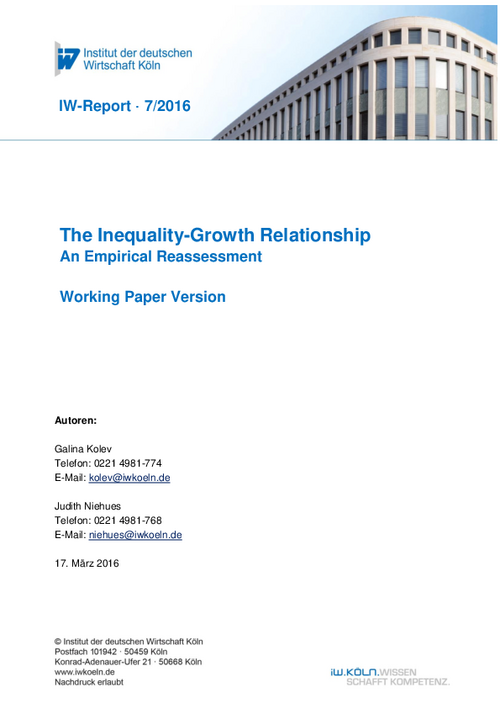An Empirical Reassessment

The Inequality-Growth Relationship
IW-Report

An Empirical Reassessment
Recently, some influential empirical studies found evidence in favour of a negative relationship between income inequality and economic growth, implying the conclusion that inequality reducing policies will foster economic growth. The studies have in common that they all rely on the System GMM dynamic panel estimator. We argue that this estimator is most likely to suffer from a severe weak instrument problem in the inequality-growth setting because lagged differences of inequality have practically no explanatory power for current inequality levels. Thus, it is biased in the direction of OLS and fails to control for country heterogeneity. Using traditional Fixed Effects models or Difference GMM estimators yields positive coefficients on the inequality variable. Furthermore, we find evidence for a nonlinear relationship between inequality and growth when considering a sample of developed and developing economies. Thus, the effect of net income inequality on growth seems to be negative only for less-developed countries and for countries with high levels of inequality, and non-significant or rather positive otherwise.

Galina Kolev / Judith Niehues: The Inequality-Growth Relationship – An Empirical Reassessment
IW-Report


Inflation in der Eurozone: Der Weg bleibt holprig
Die Inflation in der Eurozone befindet sich auf dem Rückzug. Ein Aufatmen wäre aber verfrüht. Zweitrundeneffekte im Arbeitsmarkt sind im vollen Gange und setzen die Geldpolitik weiter unter Druck.
IW
Kabinett beschließt Wachstumspaket: „Kein großer Wurf, aber ein Zeichen”
Im Interview mit dem Deutschlandfunk erklärt IW-Geschäftsführer Hubertus Bardt, er erwarte von der Bundesregierung weitere Schritte für mehr Wirtschaftswachstum. Im vom Kabinett verabschiedeten Haushaltsentwurf würden zwar kleinere Dinge adressiert, insgesamt ...
IW